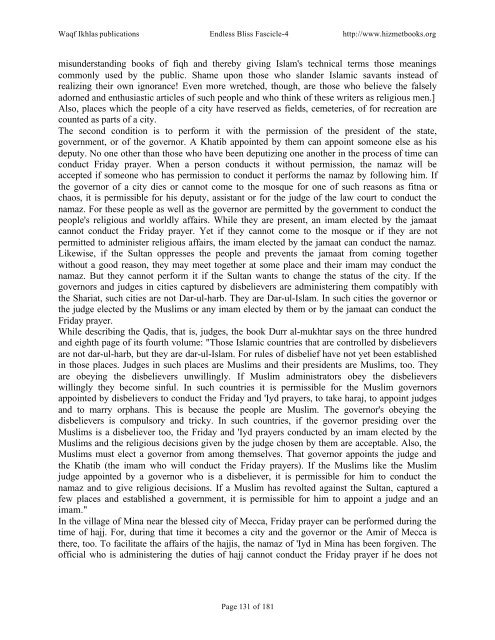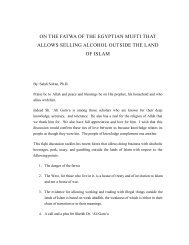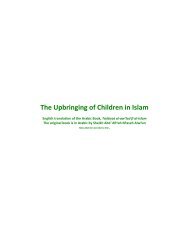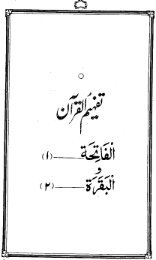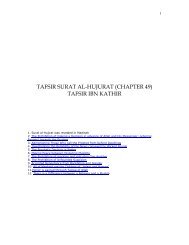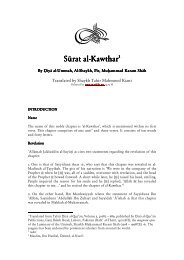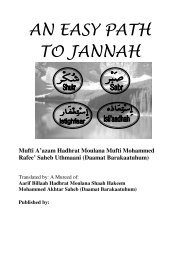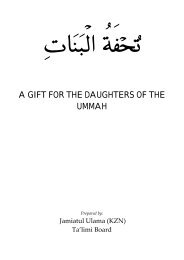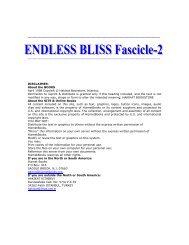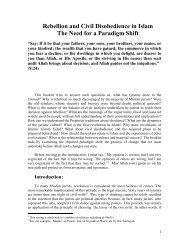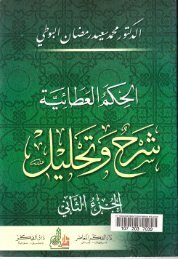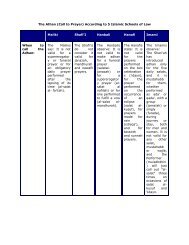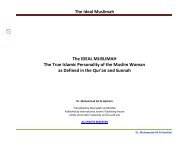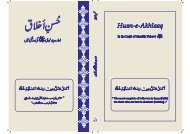ENDLESS BLISS FASCICLE-4
ENDLESS BLISS FASCICLE-4
ENDLESS BLISS FASCICLE-4
You also want an ePaper? Increase the reach of your titles
YUMPU automatically turns print PDFs into web optimized ePapers that Google loves.
Waqf Ikhlas publications Endless Bliss Fascicle-4 http://www.hizmetbooks.org<br />
misunderstanding books of fiqh and thereby giving Islam's technical terms those meanings<br />
commonly used by the public. Shame upon those who slander Islamic savants instead of<br />
realizing their own ignorance! Even more wretched, though, are those who believe the falsely<br />
adorned and enthusiastic articles of such people and who think of these writers as religious men.]<br />
Also, places which the people of a city have reserved as fields, cemeteries, of for recreation are<br />
counted as parts of a city.<br />
The second condition is to perform it with the permission of the president of the state,<br />
government, or of the governor. A Khatib appointed by them can appoint someone else as his<br />
deputy. No one other than those who have been deputizing one another in the process of time can<br />
conduct Friday prayer. When a person conducts it without permission, the namaz will be<br />
accepted if someone who has permission to conduct it performs the namaz by following him. If<br />
the governor of a city dies or cannot come to the mosque for one of such reasons as fitna or<br />
chaos, it is permissible for his deputy, assistant or for the judge of the law court to conduct the<br />
namaz. For these people as well as the governor are permitted by the government to conduct the<br />
people's religious and worldly affairs. While they are present, an imam elected by the jamaat<br />
cannot conduct the Friday prayer. Yet if they cannot come to the mosque or if they are not<br />
permitted to administer religious affairs, the imam elected by the jamaat can conduct the namaz.<br />
Likewise, if the Sultan oppresses the people and prevents the jamaat from coming together<br />
without a good reason, they may meet together at some place and their imam may conduct the<br />
namaz. But they cannot perform it if the Sultan wants to change the status of the city. If the<br />
governors and judges in cities captured by disbelievers are administering them compatibly with<br />
the Shariat, such cities are not Dar-ul-harb. They are Dar-ul-Islam. In such cities the governor or<br />
the judge elected by the Muslims or any imam elected by them or by the jamaat can conduct the<br />
Friday prayer.<br />
While describing the Qadis, that is, judges, the book Durr al-mukhtar says on the three hundred<br />
and eighth page of its fourth volume: "Those Islamic countries that are controlled by disbelievers<br />
are not dar-ul-harb, but they are dar-ul-Islam. For rules of disbelief have not yet been established<br />
in those places. Judges in such places are Muslims and their presidents are Muslims, too. They<br />
are obeying the disbelievers unwillingly. If Muslim administrators obey the disbelievers<br />
willingly they become sinful. In such countries it is permissible for the Muslim governors<br />
appointed by disbelievers to conduct the Friday and 'Iyd prayers, to take haraj, to appoint judges<br />
and to marry orphans. This is because the people are Muslim. The governor's obeying the<br />
disbelievers is compulsory and tricky. In such countries, if the governor presiding over the<br />
Muslims is a disbeliever too, the Friday and 'Iyd prayers conducted by an imam elected by the<br />
Muslims and the religious decisions given by the judge chosen by them are acceptable. Also, the<br />
Muslims must elect a governor from among themselves. That governor appoints the judge and<br />
the Khatib (the imam who will conduct the Friday prayers). If the Muslims like the Muslim<br />
judge appointed by a governor who is a disbeliever, it is permissible for him to conduct the<br />
namaz and to give religious decisions. If a Muslim has revolted against the Sultan, captured a<br />
few places and established a government, it is permissible for him to appoint a judge and an<br />
imam."<br />
In the village of Mina near the blessed city of Mecca, Friday prayer can be performed during the<br />
time of hajj. For, during that time it becomes a city and the governor or the Amir of Mecca is<br />
there, too. To facilitate the affairs of the hajjis, the namaz of 'Iyd in Mina has been forgiven. The<br />
official who is administering the duties of hajj cannot conduct the Friday prayer if he does not<br />
Page 131 of 181


